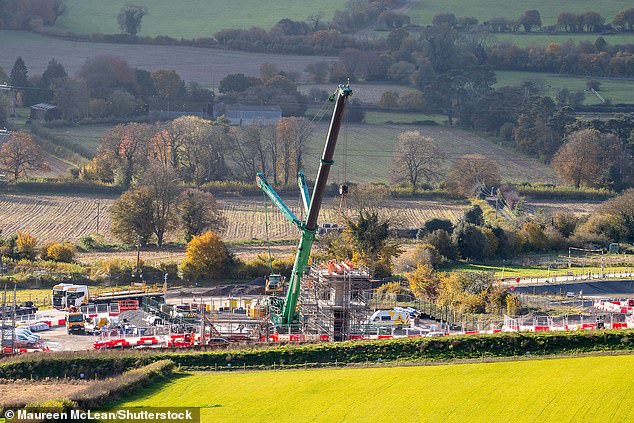Pothole-related breakdowns have risen by 10 per cent in a year as the UK’s road crisis continues
Britain’s pothole epidemic is on the rise, with the RAC experiencing 10 per cent more breakdowns due to motorists driving through potholes than a year ago.
In the year to the end of March, the RAC received around 27,205 calls for breakdowns due to poor road surfaces in Britain. That compares with 24,906 in the previous twelve months, the car service company said.
The new figures are revealed after the RAC said it had been called to a record number of road breakdowns in 2023 as the government and local authorities fail to understand the country’s crumbling road crisis.
Britain’s pothole crisis is getting worse and worse every year, with the RAC having already attended almost 8,000 (7,904) breakdowns in the first three months of 2024 due to the poor road surface in Britain. British motorists are now twice as likely to have a breakdown due to a pothole than in 2006
In the first three months of 2024, the breakdown service recorded almost 8,000 (7,904) calls for pothole-related damage due to the deteriorating road surface in Britain.
Roadside patrols have been called in to investigate an average of 87 pothole-related breakdowns a day, due to defects such as broken suspension springs, damaged shock absorbers and deformed wheels.
This is 22 percent fewer breakdowns due to potholes than the RAC experienced between January and March 2023 (10,076), which the company attributes to the ‘unusually mild weather’ at the beginning of this year.
In the first three months of 2023, only seven days of frost were recorded (compared to the usual nine), which could have potentially limited the number of brand new pits.
During the winter months, freezing temperatures normally cause more surface deterioration as water gets into cracks in the road, freezes and expands.
The RAC’s Pothole Index – which measures the likelihood of a pothole-related warning – suggested warmer temperatures have helped Britain ‘dodge a pothole bullet’.
While calls for pothole problems fell in the first quarter of 2024 compared to the same three months in 2023, they were 53 percent higher than the last three months of last year.
The RAC said this is a ‘clear sign that Britain is suffering a pothole epidemic as roads continue to crumble’.
And compared to 2006 – when the RAC first started tracking these faults – motorists are now almost twice as likely to experience pothole damage.
This is Money reported that pothole damage cost British motorists £500 million last year.
The number of pothole-related insurance claims has also increased by 40 percent in a year and has also reached record highs.

Construction work for the HS2 railway line is taking place at the Wendover Dean Viaduct in Buckinghamshire. Ministers have claimed that funds from the canceled project will be used to improve road maintenance
The RAC is calling on local authorities to allocate recent government funding to better tackle the road surface crisis.
In October, the government announced it would provide £8.3 billion in additional funding over 11 years to plug the gaps in England.
This was part of the Network North strategy to use the money saved by scrapping the planned extension of HS2 north of Birmingham.
However, according to the latest analysis from the Asphalt Industry Alliance, the cost of patching up pothole-plagued local roads in England and Wales is estimated at £16.3 billion.
RAC head of policy Simon Williams said: ‘All the cracks left by years of shrinking road maintenance budgets cannot be easily filled.
‘Even though the Government has given councils a further £8.3 billion for road maintenance due to the cancellation of the northern part of HS2, we know this is only enough to re-pave 5,000 miles of roads – the equivalent of just 3 per cent of all local roads in England. weigh.
‘To make the most of this funding, we urge local authorities to focus their efforts on resurfacing the worst roads in their area, rather than futilely trying to repair pothole-ridden roads that cannot be saved from further disrepair saved.
‘And now is the time to take preventative action as it is between the warmer months of April and September when crucial surface treatment work can be carried out to extend the life of roads.
‘Unfortunately, the government data we analyzed shows that 60 per cent of English councils did not undertake any such work in the 2022-2023 financial year.’
A Department for Transport spokesperson responded: ‘Local highway authorities are responsible for maintaining their road networks, but we are supporting them with £8.3 billion of redistributed HS2 funding over the next ten years, the biggest ever increase in funding for local road improvements. on top of an existing £5.5 billion fund.
‘Local authorities received the first £150 million of this increase within weeks of announcing our additional funding in October, and will receive a further £150 million this year to further improve local roads.’
Darren Rodwell, transport spokesperson for the Local Government Association, added: ‘Councils share the concerns of all road users about the state of our roads and are doing everything we can to tackle the £16.3 billion backlog of road repairs, including learning and adopting innovative techniques.
‘Increased, long-term and year-on-year consistency of funding for the maintenance of all parts of our highways will help them achieve this.
“The government should provide provincial highway departments with five-year funding allocations to bring them on par with national highways, to provide greater certainty, so that they can develop resurfacing programs and other highway improvements, to help them tackle the plague of potholes.’
Some links in this article may be affiliate links. If you click on it, we may earn a small commission. That helps us fund This Is Money and keep it free to use. We do not write articles to promote products. We do not allow a commercial relationship to compromise our editorial independence.
